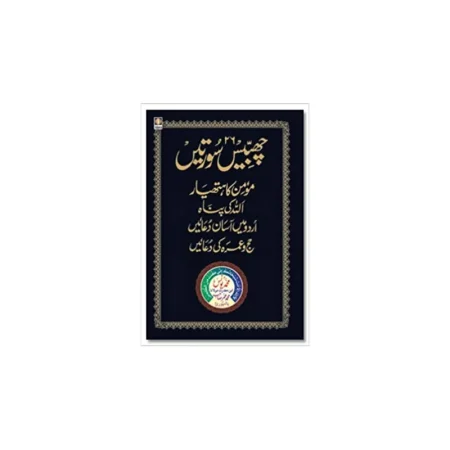Islam Ki Haqiqat Maulana Syed Abul Alla Maududi Mmi Hindi
₹26.00 Original price was: ₹26.00.₹25.00Current price is: ₹25.00.
- Name: Islam Ki Haqiqat
- Writer: Maulana Syed Abul Alla Maududi
- Publisher: Mmi
- Language: Hindi

Islam Ki Haqiqat Maulana Syed Abul Alla Maududi Mmi Hindi
₹26.00Original price was: ₹26.00.₹25.00Current price is: ₹25.00.Request a Call Back
This contact form is available only for logged in users.
- Delivery & Return
How Does The Delivery Process Work ?
- Once Our System Processes Your Order, Your Products Are Inspected Thoroughly To Ensure They Are In Perfect Condition.
- After They Pass Through The Final Round Of Quality Checks, They Are Packed And Handed Over To Our Trusted Courier Partners.
- Our Delivery Partners Then Bring The Package To You At The Earliest Possibility. In Case, They Are Unable To Reach Your Provided Address Or At A Suitable Time, They Will Contact You To Resolve The Issue.
How Are Items Packed ?
We Package Our Products In Corrugated Boxes, Which Are Covered With 3 Layer Protection. Each Individual Product Is Packed In Bubble Wrap While Fragile Items Like Bottles Are Safely Secured With Additional Bubble Wrap. We Pride Ourselves On The Quality Of Our Packaging.What Is The Range Of Locations To Which Daarul Kitab & Islamic Store Ships It’s Products ?
We Shipped Our Products Pan India!My Order Has Been Shipped, How Can I Track It ?
Once Your Order Has Been Dispatched, You Will Receive An Email And SMS With Tracking Details.You Can Track The Status Of Your Order Within 24 – 48 Hours After Your Order Is Dispatched From Our Warehouse.Following Are Some Of Our Trusted Courier Partners: eKart Logistics, BlueDart, Delhivery, Xpressbees, Ecom Express, DTDC & ShadowfaxWhat Is The Estimated Delivery Time ?
It Takes 3-7 Business Days To Deliver The Order Once Order Has Been Dispatched.Though We Keep 95% Of Our Catalog In Our Inventory, Certain Products Need To Be Sourced Directly From The Brand Itself So That We Can Live Up To Our Promise Of Providing Fresh, Non-expired Products.Are There Any Shipping Charges Applicable To My Order ?
We Have Different Shipping Charges For Different Zones Which Start From 60₹ To 100₹ Is Applied To All Orders Below ₹1999, While There Is Free Shipping For All Orders Above ₹1999Note: Please Take A Video/Photos While Opening A Order You Received We Need It If Anything Goes Wrong With You Order Between Journey Of Our Warehouse To Your Doorstep, If You Find Order Is Damaged Or Intact Please Do Not Accept The Order Delivery .
Disclaimer: Any Complaints Related To Product/Delivery Should Be Brought To Our Notice Within 48 Hours From The Time Of Delivery.
Help
Give us a shout if you have any other questions and/or concerns. Email: support@daarulkitab.com Phone: +918755553311 WhatsApp: +918755553311 - Ask a Question

Islam Ki Haqiqat Maulana Syed Abul Alla Maududi Mmi Hindi
₹26.00Original price was: ₹26.00.₹25.00Current price is: ₹25.00.Ask a Question
This contact form is available only for logged in users.
Islam Ki Haqiqat Maulana Syed Abul Alla Maududi Mmi Hindi
Overview: “Islam Ki Haqiqat” delves into the essence and reality of Islam, presenting a clear and authentic understanding of the religion. Maulana Syed Abul Ala Maududi, a renowned Islamic scholar and the founder of Jamaat-e-Islami, provides comprehensive explanations of the core principles, beliefs, and practices of Islam. The book aims to educate both Muslims and non-Muslims about the true nature of Islam, dispelling common misconceptions and highlighting its spiritual and practical aspects.
Key Themes:
- Fundamental Beliefs of Islam:
- The book outlines the essential beliefs of Islam, including the oneness of Allah (Tawhid), the prophethood of Muhammad (PBUH), the significance of the Quran, and the belief in the afterlife.
- It emphasizes the importance of faith (Iman) and how it shapes the life of a Muslim.
- Pillars of Islam:
- Maulana Maududi explains the Five Pillars of Islam: Shahada (the declaration of faith), Salah (prayer), Sawm (fasting during Ramadan), Zakat (charitable giving), and Hajj (pilgrimage to Mecca).
- He provides detailed insights into the spiritual and communal benefits of these practices.
- Islamic Morality and Ethics:
- The book discusses the moral and ethical teachings of Islam, emphasizing values such as honesty, justice, compassion, and humility.
- It explores how these values are integral to the Islamic way of life and contribute to the betterment of society.
- Role of Sharia:
- Maulana Maududi provides an explanation of Sharia (Islamic law) and its role in guiding the personal and communal lives of Muslims.
- He addresses common misconceptions about Sharia and highlights its principles of justice and fairness.
- Comparison with Other Religions:
- The book includes comparisons with other major world religions, highlighting the unique aspects of Islam while also recognizing common values.
- It aims to promote interfaith understanding and respect.
- Contemporary Relevance:
- Maulana Maududi discusses the relevance of Islamic teachings in the modern world, addressing contemporary issues and challenges faced by Muslims.
- He emphasizes the adaptability of Islamic principles to various cultural and societal contexts.
Purpose: The primary purpose of the book is to provide a clear and comprehensive understanding of Islam, its beliefs, practices, and moral teachings. Maulana Maududi aims to educate both Muslims and non-Muslims, promoting a deeper appreciation of the religion and dispelling common misconceptions. By presenting the true essence of Islam, the author seeks to foster mutual understanding and respect among people of different faiths.
| Weight | 100 g |
|---|---|
| Dimensions | 15 × 10 × 8 cm |
Related Products
- 40 Daily Prayers (Ibs) English/Arabic
1 in stock
- A Gift To The Husband And Wife Maulana Muhammad Ashraf Ali Thanwi Idara (English)
3 in stock
- A Gift For Muslim Women Maulana Ashiq Iilahi Madani Idara (English)
4 in stock
- 26 Chabbis Suraten Mohd Yunus Ibn Hazrat Maulana Mohd Umar Sahab Palanpuri Ra) Farid Arabic/Urdu
3 in stock
1 in stock
- A Politico-Cultural Study Of The Great Mughuls (1526-1707) Dr. Muhammad Qamaruddin Adam Publishers (English)
1 in stock
- Aadaabul Muaasharat Etiquettes Of Social Life Maulvi Ashraf Ali Thanvi Idara (English)
2 in stock
- A Gift For Muslim Bride & Groom Idara (English)
3 in stock
1 in stock
- Aakhri Ahd-E-Mughliya Ka Hindustan Dr Mubarak Ali Al Hasanat (Urdu)
2 in stock
1 in stock














